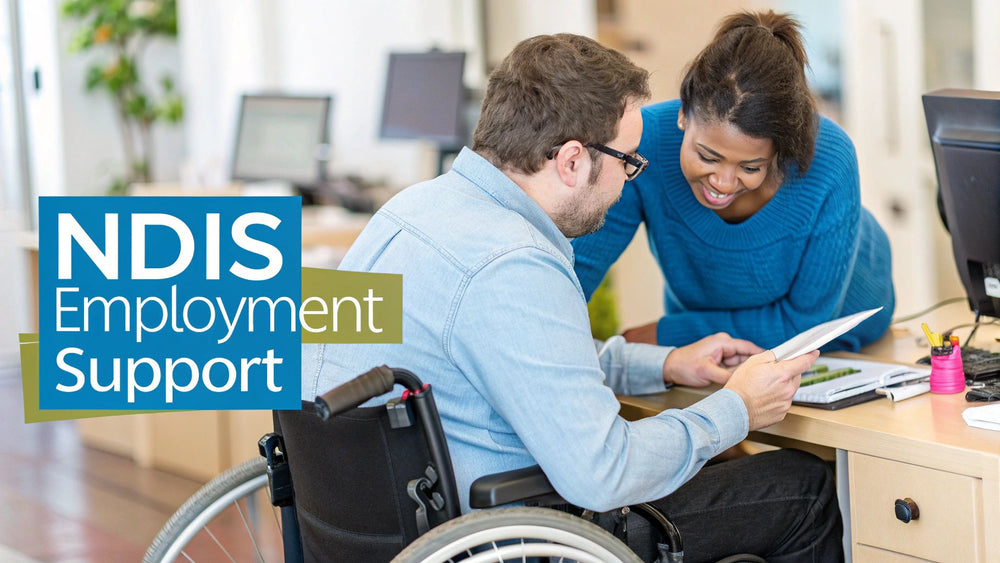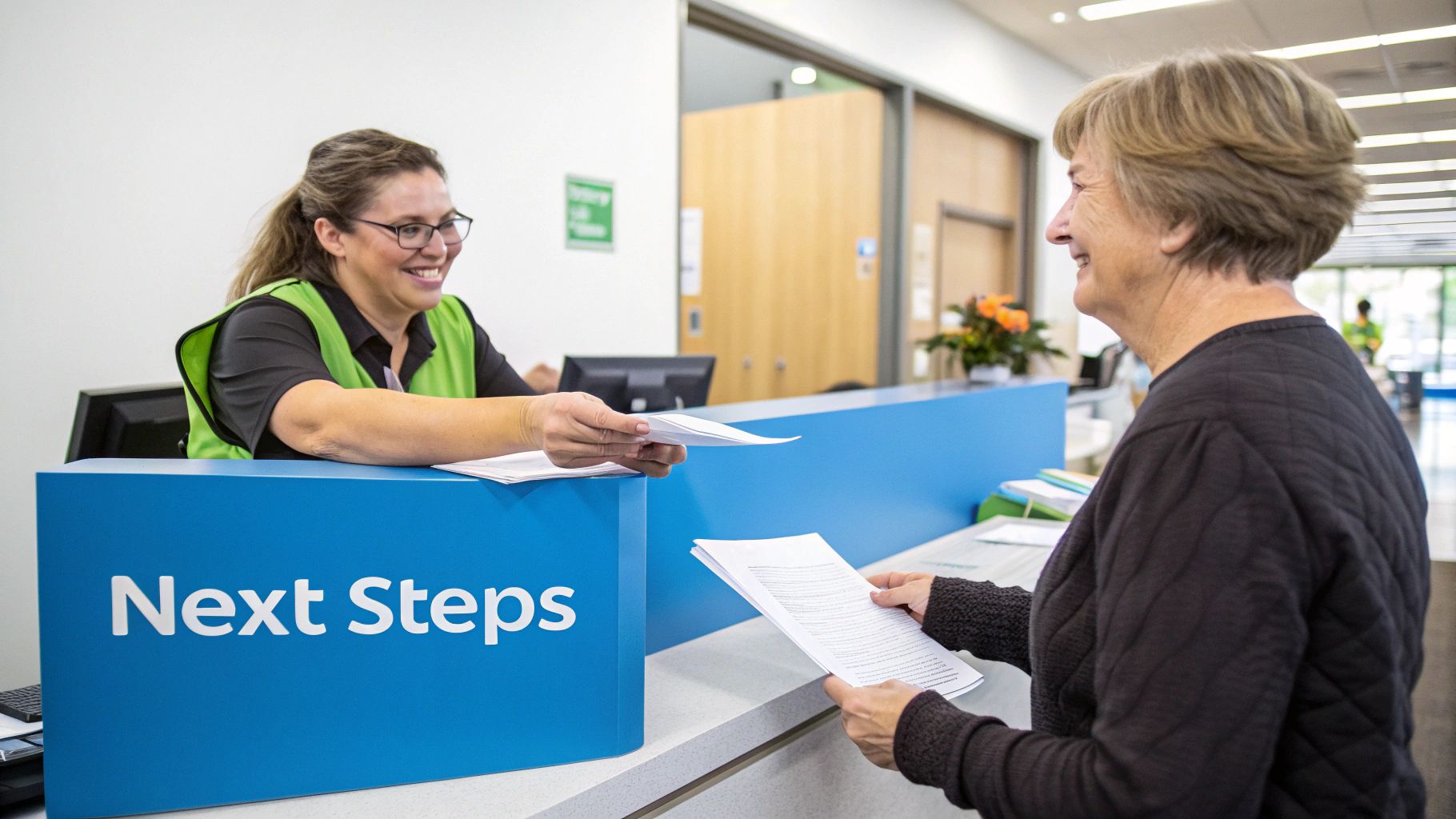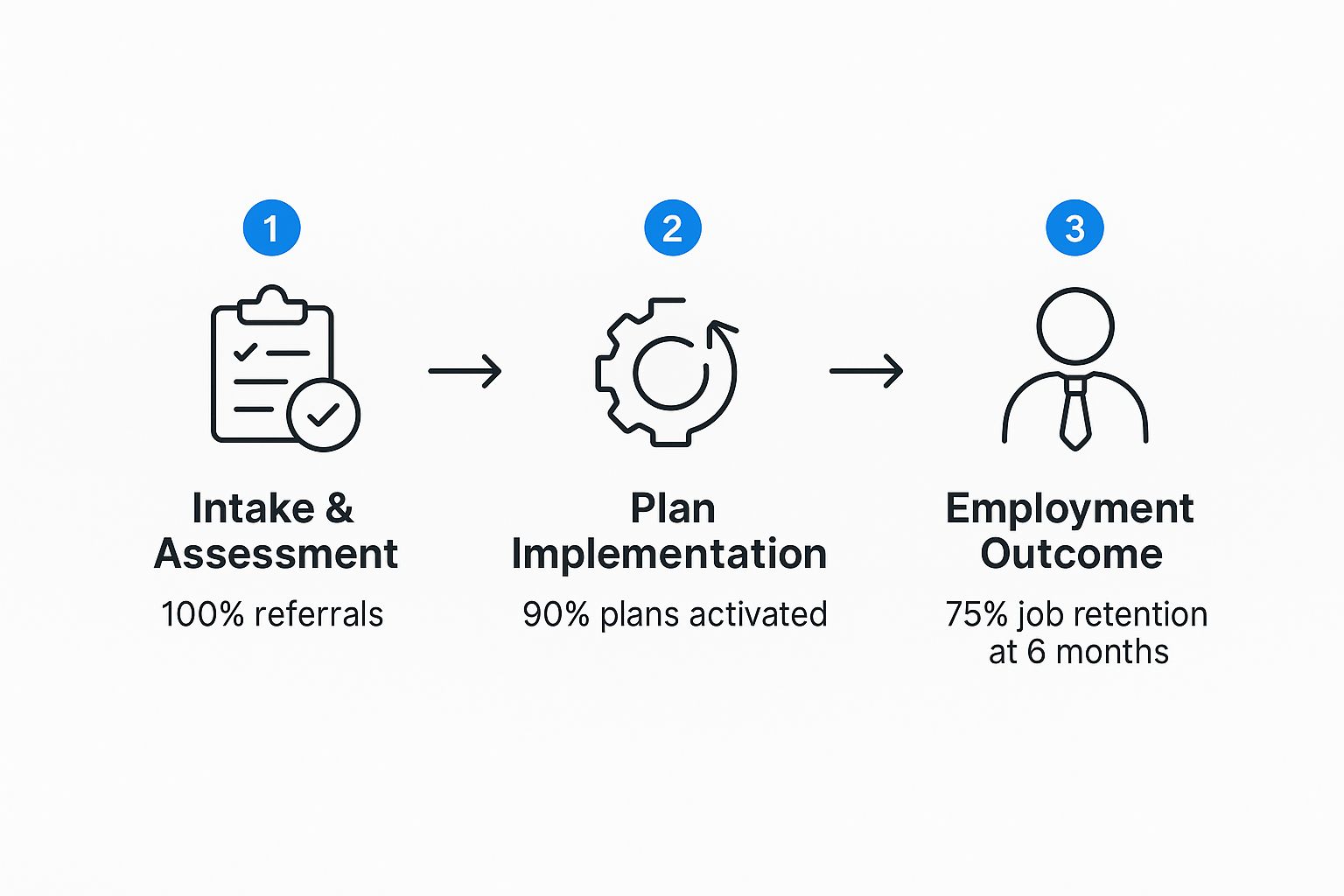Your Guide to NDIS Employment Support

So, what exactly is NDIS employment support? Think of it less like a generic service and more like a personalised toolkit, filled with funding and practical help designed to get you into a job you genuinely enjoy and can succeed in. It goes far beyond simply finding you any position; the focus is on building your skills, boosting your confidence, and setting you up for long-term career success.
What Is NDIS Employment Support, Really?

Imagine NDIS employment support as a dedicated partnership. At its core is the belief that meaningful work is a massive part of a fulfilling life—it gives us purpose, independence, and a real sense of community connection. The NDIS gets that everyone's journey to employment looks different, so it provides funding for supports that are shaped around your specific goals and challenges.
This isn't just about ticking boxes or filling quotas. It’s about empowering people with disabilities to build real, sustainable careers. That means the support you receive can cover a huge range of needs, from building skills before you even start looking for a job to having someone by your side after you've landed that dream role.
The Core Goal: Empowerment Through Work
At its heart, the whole program is about knocking down barriers and creating genuine opportunities. Having a meaningful job can do wonders for your mental and emotional wellbeing, not to mention fostering independence and providing financial security. The focus is always on what you can do, playing to your strengths and interests to find the perfect fit.
The kinds of help available are incredibly varied and can include things like:
- Skill Development: Getting help to write a killer resume, practicing your interview skills, or learning specific tasks for a job.
- Confidence Building: Working with a support person to feel truly ready and prepared for a professional workplace.
- On-the-Job Support: Having assistance to help you settle into a new role, manage your daily tasks, or navigate workplace relationships.
- Workplace Modifications: Securing funding for special equipment or changes to your work environment so you can do your job effectively.
How This Support Translates to Success
The impact of this kind of targeted support is huge, although everyone's experience is unique. Recent data shows that in a single quarter, 63% of working-age NDIS participants felt they got the help they needed to do their job. While that's a slight dip from 66% in the previous quarter, it really drives home how vital an effective support system is.
It’s also interesting to see how satisfaction varies by state. For instance, Western Australia reported the highest rate of support satisfaction at 67%. These figures give us a snapshot of the national landscape.
The ultimate goal of NDIS employment support is to move beyond just participating in the workforce and toward true career progression. It’s about building a life where your work is a source of pride, stability, and personal growth.
To get a better handle on how the NDIS fits within the wider system, it can be useful to look into resources on understanding government assistance programs. And for those of us here in South Australia, getting to grips with the local system is the crucial first step. Our guide to disability support in Adelaide offers plenty of detailed, local insights to help you harness these supports for your own journey.
How NDIS Funding Powers Your Career Goals
Getting your head around NDIS funding can sometimes feel like you're trying to learn a new language. But once you get the hang of it, you’ll see it’s the key to unlocking your career goals. The best way to think about your NDIS plan isn’t as one big pool of money, but more like a series of dedicated wallets, each with a specific job. The first step is figuring out which wallet is for your NDIS employment support.
Your funding is organised into three main buckets: Core, Capital, and Capacity Building. When it comes to getting a job, the money almost always comes from your Capacity Building budget. This is the part of your plan designed to invest in you—it's all about building your skills, boosting your independence, and helping you reach big life goals, like finding and keeping a great job.
Decoding Your Capacity Building Supports
Digging a little deeper into the Capacity Building category, you'll find specific line items for employment. These are the tools you and your provider will use to build a support plan that’s a perfect fit for your career journey. Knowing what they're called and what they do will give you a real confidence boost in your planning meetings.
To help you get started, we've put together a table that breaks down the main funding categories for employment.
NDIS Employment Support Funding Categories
| Funding Category | Primary Purpose | Examples of Supports |
|---|---|---|
| Finding and Keeping a Job | Offers flexible, hands-on support to help you find work and succeed once you're there. | Help with writing resumes, job searching, interview practice, on-the-job training, and developing workplace skills. |
| School Leaver Employment Supports (SLES) | A two-year program designed for Year 12 school leavers to smooth the transition from school to work. | Group and individual activities focused on teamwork, communication, money handling, and work experience. |
| Specialised Supported Employment | For those who need significant, ongoing support in a work environment. | Provides employment in settings like Australian Disability Enterprises (ADEs) with customised tasks and supervision. |
Think of these line items as the building blocks for your career path. For example, if you're feeling nervous about interviews, your 'Finding and Keeping a Job' funding could pay for a support worker to come with you, helping you feel comfortable and communicate your strengths.
Your NDIS plan is a dynamic tool designed to empower you. It’s not just about funding services; it's about funding outcomes. The goal is to provide the reasonable and necessary supports that directly link to your ambition of achieving meaningful employment.
Putting Your Funding into Action
So, how does all this work in the real world?
Let's say your dream is to land a job in office administration. Your NDIS funding could be used in a bunch of practical ways to get you there. A support worker might help you find and enrol in the right TAFE course, and your NDIS funds could cover transport or an in-class note-taker (though not the course fees themselves). If you need specific software to use a computer comfortably, your plan could fund an assessment to find the perfect tech for you.
And once you’ve got the job? That same funding can pay for a support worker to help you settle in for the first few weeks, learning the ropes and getting to know your new colleagues.
It’s absolutely vital that every support is clearly laid out and agreed upon with your provider in a service agreement. This document makes sure everyone is on the same page. To really nail this part, take a look at our helpful guide to your NDIS service agreement, which explains exactly how to protect your rights and get the most out of your plan. This clarity is what ensures your funds are used effectively to power your career from day one.
Understanding the Growing Need for NDIS Services

It’s no secret that the demand for high-quality NDIS employment support is on the rise. As the National Disability Insurance Scheme has rolled out across the country, more people are getting the funding they need to chase their career ambitions. This has led to a welcome surge of individuals looking for the right partner to help them find and keep a job they love.
This isn't just a number on a spreadsheet; it reflects a broader shift in Australia towards greater community inclusion. For you, this is fantastic news. It means more opportunities are opening up, but it also makes choosing the right provider more important than ever—you need someone who can truly follow through.
Knowing this background helps you make a smarter choice. When you grasp the scale of the need, you can see the real value in a provider that’s prepared, well-resourced, and genuinely committed to seeing you succeed. It’s about finding a partner who is not just keeping up, but is actively building their ability to serve you well for the long haul.
A National Push for a Stronger Workforce
With so many new participants joining the NDIS, the disability support sector is feeling the pressure. The simple truth is that there's a national shortage of skilled workers to meet this incredible demand. This isn't just a problem here in South Australia; it's a challenge being tackled right across the nation.
The need for more support workers is fuelled by the rapid growth in NDIS participants and other demographic trends. To put it in perspective, there were recently around 3,750 unfilled vacancies in the NDIS workforce. That gap is only expected to grow, with forecasts showing we’ll need an extra 83,000 NDIS workers to meet future needs. In response, the Australian Government has stepped up with strategies like the National Workforce Plan to attract, train, and keep talented professionals in the sector.
This national focus is a huge positive for NDIS participants. It shows a system-wide dedication to lifting the quality and availability of all supports, especially for employment. It also means that providers who are serious about investing in their staff are getting ahead of the curve and aligning with the future of disability care.
Why This Matters for Your Choice of Provider
So, how does this bigger picture affect your personal employment journey? It means that when you’re picking an NDIS provider, you're not just buying a service. You're choosing a partner who has to be skilled at navigating a very complex and demanding environment.
A great provider, like Vana Care, understands these challenges and tackles them head-on. They invest in their people, making sure their support workers are not only caring but also highly skilled and tuned into the local job market. This is absolutely vital in a place like Adelaide, where knowing the right people can make all the difference.
When you're looking at different providers, keep these questions in mind:
- Staff Development: How do they talk about training and supporting their team? A happy, well-supported team is more likely to provide excellent support to you.
- Local Expertise: Do they really know the South Australian employment scene inside and out?
- Personalised Matching: What’s their process for pairing you with a support worker who genuinely gets you and your goals?
Making a great choice means looking past the glossy brochures. By understanding the wider context, you can spot the providers who are truly set up for excellence and ready for what’s next. To get more insight, exploring the future of disability care and trends in SA can give you a clearer view for your decision.
Your Step-By-Step Guide to Getting Support
Getting NDIS employment support funded in your plan can feel like a mountain to climb, but it's much easier when you break it down into manageable steps. The trick is to be well-prepared and clearly connect your career goals with the specific support you need because of your disability. Think of it as telling your story and showing how the right supports will help you reach your professional aspirations.
Your NDIS planning meeting or review should feel like a conversation, not an exam. Your role is to paint a vivid picture for your Planner or Local Area Coordinator (LAC), showing them where you want to go and what you need to get there. It’s all about building a solid case for why employment support is a "reasonable and necessary" part of your plan.
Preparing for Your Planning Meeting
Preparation is everything. Seriously. Walking into your meeting with a clear vision and organised paperwork makes a world of difference. Your aim is to leave no doubt that you're genuinely motivated to work and that specific supports will help you overcome the barriers your disability presents.
First, let's think about your career goals. Don't stress if they aren't crystal clear just yet; even a general idea is a fantastic starting point. Do you see yourself working outdoors? Do you thrive in a team environment? Answering these kinds of questions helps narrow down the types of support you might need.
To help make your goals more solid, try these ideas:
- Create a Vision Board: This might sound a bit cheesy, but cutting out pictures or words that represent your dream job or ideal workplace can be a surprisingly powerful way to communicate your ambitions.
- List Your Strengths and Interests: What are you good at? What do you actually enjoy doing? This helps pinpoint potential job pathways that you'll find genuinely fulfilling.
- Talk to People: Chat with friends, family, or your support coordinator about your career ideas. They can often offer fresh perspectives you hadn't even thought of.
Once you have some ideas, the next step is to gather your evidence. This is the absolute foundation of a successful NDIS application. You’ll need reports and assessments from professionals that specifically recommend employment supports.
The single most important piece of evidence is often a Functional Capacity Assessment (FCA) from an Occupational Therapist. This report breaks down how your disability impacts your capacity for work and makes direct recommendations for the supports you need to find and keep a job.
Linking Your Goals to Your Disability
The NDIS needs to see a clear, direct line between your employment goal and the support you’re asking for. It’s not enough to just say, "I want a job." You have to explain why you need the support. For example: "Because of my disability, I need [specific support] to achieve my goal of working as a [desired role]."
Here’s how that might sound in practice:
- "My anxiety makes job interviews incredibly overwhelming, so I need a support worker to help me practice and to come with me to interviews."
- "I struggle with time management and organisation, so I need on-the-job support to help me learn my tasks and create a daily schedule that works for me."
This level of detail helps your planner understand that the support isn't just a 'nice to have'—it's essential for your success.
The infographic below shows the typical journey, from first accessing supports to finally achieving stable employment.

As you can see, while almost every referral leads to an assessment and most plans get activated, keeping that job long-term is a major milestone and the ultimate goal.
It’s worth noting that you're tapping into a massive and growing industry. Australia's Health Care and Social Assistance sector, which includes NDIS employment support roles, recently employed around 2.297 million people—that’s a huge 15.8% of the entire Australian workforce. With over 660,000 active NDIS participants, the demand for skilled support is enormous, and knowing how to secure these funds has never been more vital. You can read more about these workforce trends and their impact on hiring. By doing your homework, you put yourself in the best possible position to access this incredible network of professional support.
How to Choose the Right Employment Provider

Once you’ve got NDIS employment support funding in your plan, the next big step is picking the right provider. This is one of the most important decisions you'll make on your career journey. Think of it like choosing a co-pilot; you need someone who not only knows the way but also understands your personal style of travel.
Finding a great provider is about much more than just ticking boxes. It’s about finding a genuine partner who is truly invested in your success. You’re looking for an organisation that just feels right, communicates well, and shows a real interest in your personal and professional ambitions.
Look Beyond the Brochure
Any provider can put together a slick website or a glossy brochure. What really counts is their approach, their experience, and their connections within the community. A quality provider won’t see you as just another participant; they'll take the time to really get to know your unique strengths, what you’re passionate about, and the specific hurdles you might face.
As you start your search, focus on these key areas:
- Specialisation: Do they have a solid track record of working with people who share your goals or disability? Some providers excel in certain industries, like retail or IT, which could give you an edge.
- Community Roots: A provider with deep roots in the South Australian job market can open doors that others can’t. They’ll know which local employers are genuinely committed to building inclusive teams.
- Personalised Approach: Is it a one-size-fits-all program, or will they design a support plan that’s built around you? The best providers, like Vana Care, put people first, focusing on matching you with support workers who truly get you.
Key Questions to Ask Potential Providers
The best way to figure out if a provider is the right fit is to arm yourself with good questions. Don't be afraid to dig deep to understand their process and their philosophy. Treat these initial chats like an interview—because, at the end of the day, you're hiring them to work for you.
Here’s a list of essential questions to help guide your conversations:
- Matching Process: How exactly do you match me with a potential employer? Can you walk me through that process?
- On-the-Job Support: What happens if I hit a snag at work or need some extra help settling in?
- Support Worker Pairing: How do you choose the right support worker for me? Is it possible to meet them beforehand?
- Employer Network: What kind of relationships do you have with local businesses here in Adelaide and across South Australia?
- Success Stories: Could you share some examples of how you've helped others with goals similar to mine?
- Communication: How often will we check in? Who will be my main contact if I have questions?
Finding the right provider is less about finding a service and more about building a relationship. You are looking for a team that will champion your ambitions, celebrate your wins, and support you through any setbacks with compassion and expertise.
Making this choice is a huge part of your journey, so it’s perfectly okay to take your time to get it right. For more local insights, our Vana Care guide to choosing the right disability support in Adelaide has practical tips that can help you find the perfect match for all your NDIS needs.
Real Stories of Employment Success
It's one thing to talk about funding categories and application processes, but where the real magic happens is in the lives changed by NDIS employment support. These aren't just line items in a plan; they're the tools that help real people land and succeed in jobs they love. Let's look at a couple of stories to see what this looks like on the ground.
Take Alex, for example. He's a bright young man fresh out of Year 12 with a real passion for graphic design, but the whole idea of job hunting felt completely overwhelming. Through his School Leaver Employment Supports (SLES), Alex was matched with a support person. Together, they built a killer portfolio, sharpened his communication skills for interviews, and even got him comfortable navigating Adelaide's public transport system. This groundwork wasn't just about ticking boxes; it built his confidence, which ultimately helped him score an internship at a local design studio.
From Building Skills to Thriving at Work
Now, consider Maria. She's in her 30s and was ready to get back into the workforce after taking a significant break. She managed to land a role in a bustling retail store, but the fast pace and constant social interaction were a real challenge. That's where her NDIS funding for ‘Finding and Keeping a Job’ came in.
For the first few weeks, she had an on-site support worker right there with her. This was a game-changer. They broke down her duties into manageable steps, created visual checklists for stocking shelves, and even role-played different customer scenarios. This hands-on coaching didn't just help Maria keep her job—it helped her thrive. Before long, she was a valued member of the team, known for her incredible attention to detail.
These powerful stories show just how flexible and practical the support can be:
- Getting Ready for Work: This could be anything from putting together a standout resume and practicing interview skills to exploring what career paths are out there.
- Making the Transition: Support to bridge the gap between a structured place like school and the professional world.
- Coaching on the Job: Having someone to help you learn new tasks, understand the workplace culture, and manage your day-to-day responsibilities.
- Workplace Adjustments: Organising special equipment or making changes to the work environment so an employee can do their job well.
Seeing What Is Possible
These examples aren't just nice anecdotes; they're roadmaps to what's achievable. They prove that with the right kind of personalised help, the barriers to finding and keeping a great job can be overcome. Everyone's journey is different, and that's precisely why NDIS employment support is designed to be so flexible.
The real aim is to turn "I wish I had a job" into "I love my work." These success stories show that meaningful employment isn't a pipe dream—it’s a tangible goal for everyone.
The common thread weaving through these experiences is the power of one-on-one support. It’s about having a partner who gets your ambitions and helps you build a practical bridge to achieve them. At Vana Care, we've had a front-row seat to see how this partnership builds confidence and opens doors. You can read more about this in some of our inspiring client success stories from Vana Care. Seeing how it works for others really helps you imagine what’s possible for your own career.
Got Questions About NDIS Employment Support? We've Got Answers
It's completely normal to have questions when you're figuring out NDIS employment support. Let's walk through some of the most common ones so you can feel more confident about your path to a great job.
What if I Change My Mind About My Career Goals?
Of course, you can. People change their minds about careers all the time, and your NDIS plan is designed to be flexible enough to change with you. You might discover a new interest or realise your old goal isn't the right fit anymore. That's life!
When your career goals shift, the best first step is to have a chat with your support coordinator or provider. You might need to ask for a plan review to make sure your funding is redirected to supports that match your new aspirations. The main thing is to show how this new goal is still a reasonable and necessary way to use your NDIS funds.
Can the NDIS Help Me Start My Own Business?
This is a fantastic question we hear a lot. While the NDIS won't directly pay for business start-up costs—things like buying stock or leasing a shopfront—it absolutely can fund supports that help you build the skills and capacity to become a successful business owner.
A good way to think about it is that the NDIS funds the person, not the business itself. So, what could that look like?
- Getting help from a support worker to put together a solid business plan.
- Funding for training or mentorship in crucial areas like marketing or managing your finances.
- Therapeutic support to develop the confidence and practical skills you need for self-employment.
What’s the Difference Between DES and NDIS Support?
Understanding this difference is key. Disability Employment Services (DES) is a separate government program focused squarely on helping people with a disability find a job. Think of them as job-seeking specialists.
NDIS employment support, on the other hand, comes from your personal NDIS plan. It’s there to help you overcome specific barriers your disability might present in the workplace.
The great news is you don't have to choose one over the other; they can work hand-in-hand. For example, you could use a DES provider to help you find and apply for jobs, while using your NDIS funds for a support worker to help you learn the ropes once you start.
What Can I Do if I’m Not Happy With My Provider?
It’s important to know you always have options if things aren’t working out. First, try talking directly to your provider. Clearly and calmly explain what your concerns are—sometimes a simple conversation can fix everything.
If that doesn't resolve the issue, you can take your complaint to the NDIS Quality and Safeguards Commission. They are an independent agency set up specifically to handle these kinds of problems and protect your rights.
Finding the right team to back you on your employment journey makes all the difference. At Vana Care, we take a human-first approach. We focus on matching you with support workers who genuinely get you, share your interests, and are committed to helping you succeed. To find out more about our personalised disability support in Adelaide, feel free to explore our services at Vana Care.


